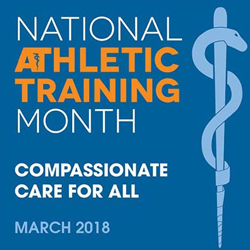March: National Athletic Trainers Month

Athletic trainers specialize in prevention, examination, evaluation, immediate care, and rehabilitation for acute or chronic conditions or injuries that result from physical activities, sports. Athletic training is recognized by the American Medical Association as an allied healthcare profession. March is National Athletic Trainers Month to honor and spread awareness about their important work.
Researchers presented a study at the American Academy of Pediatrics comparing sports injury data on girls’ high school soccer and basketball programs with athletic trainers to high school programs without athletic trainers for the same sports and time period. Injuries were one to 2 times higher without an AT. Recurrent injuries were three to six times higher without an AT. Concussion injuries were four to eight times higher with an AT because they are highly trained in concussion protocol. “Athletic trainers facilitate treatment of injuries and monitor recovery so that athletes are not returned to play prematurely. This likely explains the lower rates of recurrent injuries in schools with athletic trainers. … Concussed athletes are more likely to be identified in schools with athletic trainers and thus more likely to receive proper treatment,” concludes Dr. Cynthia LaBella, MD, FAAP.
ATs responsibilities begin with prevention:
- Proper use of equipment
- Best safety techniques, such as tackling
- Recognize potential hazards, uneven surfaces, faulty equipment
- Importance of hydration
- Bandages and braces for protection
- Stretch and warm-up
- Muscle-strengthening or conditioning
- Recognize fatigue. Injuries usually happen late in the game and late in the season.
When an injury occurs, ATs see the immediate injury and agony, not days or weeks later. They triage the injury and determine the order and priority of treatment and transport. ATs recognize a game-stopping injury that requires an ambulance to the hospital, such as a ruptured spleen, open dislocation or fracture, or any neck or spine injury. However, most injuries are evaluated by the AT and diagnosed and treated by the high school team physician, who may not be an orthopedic specialist.
DOC provides ATs a resource for orthopedic care. DOC is open every day of the week. The DOC team recognizes the important healthcare role of the athletic trainer and recommends that the athlete return to the AT to follow the injury through rehabilitation back to playing the sport. DOC celebrates the month of March as National Athletic Trainers Month.




